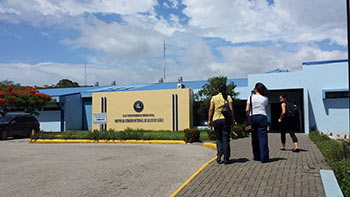New MBE track offers cross-cultural education and med-tech focus
By Shawn Hutchins
Medical device innovation today involves increasingly globalized research and development, manufacturing, funding and regulatory processes. To prepare engineers for careers in this international framework, the Rice University Department of Bioengineering expanded its nonthesis Master of Bioengineering (MBE) degree program through the launch of a unique track in global medical innovation. The distinguishing feature of the program is its intense focus on emerging markets.
The global medical innovation (GMI) track of the MBE degree is designed to prepare engineers for careers in medical technology through education in innovation, global design projects and an industry internship. This track specifically targets students who have an undergraduate degree in engineering (mechanical, electrical, chemical or bioengineering/medical) or a related field and who are interested in pursuing a career in the private, public or nonprofit sector of medical technology.

Rice GMI students and Eric Richardson (second from the right) with engineers in the sterile "clean room" at Hologic’s manufacturing facilities in Alajuela, Costa Rica. Hologic is a leading developer, manufacturer and supplier of diagnostic and surgical products and of medical imaging systems involved in women's health.
Students in the inaugural cohort of the GMI track began their global industry internship in June. Hannelle Fares, Shehryar Siddiqui, Shannon Frazee, Wei Shi and Anishaa Potnis traveled to Costa Rica — a country that has emerged over the past five years as a key player in the global medical technology industry — for an eight-week internship at Boston Scientific. The students have been chronicling their experiences online at gmi.rice.edu.
The first week of the GMI program introduced the students to Costa Rican business and culture. They kept a tight schedule as they toured three manufacturing facilities of Hologic, Volcano (Phillips) and Cyberonics. All three companies are located in the Coyol tax-exempt industrial parks in Alajuela.
Additional meetings with doctors, health care workers and professionals brought them to education centers such as Earth University–La Flor in Mercedes and research labs, clinics and hospitals in San Jose, Cañas and Liberia. Ana Cecilia Rodriguez, a lead investigator at Proyecto Epidemiológico Guanacaste, also discussed efforts for the early detection and prevention of cervical cancer in the provinces of Guanacaste and Puntarenas. Christian Marín Müller, a molecular virologist and CEO of the startup company Speratum, presented his development and use of poly(lactic-co-glycolic acid), or PLGA, nanoparticles to deliver microRNA to pancreatic cancer cells.
Before the students began their five-week total-immersion internship at Boston Scientific, they completed a two-week engineering design and industrial production “boot camp” taught by Rice lecturers Eric Richardson and Matthew Wettergreen.

Rice GMI students visited a public hospital that is part of Costa Rica's national social security system, La CAJA.
During the course, Rice students worked alongside students from the Universidad de Costa Rica (UCR) and the Instituto Tecnológico de Costa Rica (TEC) to develop strategies for bringing medical devices to market while developing their own medical device prototype. The student teams designed five potential devices, which were evaluated by a panel of judges representing Establishment Labs, Boston Scientific and Hologic, as well as professors from the UCR, TEC and the private university La Universidad Latinoamericana de Ciencia y Tecnología.
“The short course is designed to leverage the internship experience as it gives a preview of effective medical-product development from concept to commercialization, all within an international team environment,” said Richardson, who was a senior and principal R&D engineer at Medtronic before joining Rice’s bioengineering program in 2013. “The experiences will help the students identify potential emerging-market design projects for this fall and spring semesters.”
Rice’s GMI track draws from the university’s foundational strengths in bioengineering and biomedical innovation and builds from the widely recognized entrepreneurial approaches from Rice 360° and the engineering design programs at the university’s Oshman Engineering Design Kitchen.
The one-year GMI track includes bioengineering courses in product development, elective courses and guest lectures from industry and academia, visits to clinics and companies, and project-based learning experiences. The majority of the program, 60 percent, involves emerging market design projects. Prerequisite courses are fundamentals of systems physiology, cell biology and statistics.
“There is a lot of support and interest in our program in Costa Rica, and several media outlets featured the students’ activities this summer,” Richardson said. He said he is thrilled about the potential this exposure may have in “strengthening ties with international industry, increasing opportunities in international education and leading to a stronger future in clinical and translational research.”
–Shawn Hutchins is a science writer and Web specialist for the Department of Bioengineering.


Leave a Reply